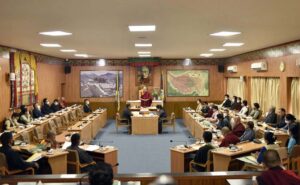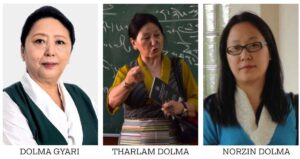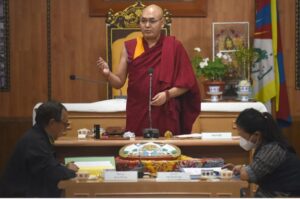
The 17th Tibetan Parliament’s first session
The 17th Tibetan Parliament-in-Exile (TPiE) convened its first session for two days from October 11 – 12, pledging to resolve the political issue of Tibet, to resolve the human rights and environmental crises in Tibet, and to oversee the welfare of Tibetans living in exile. The first day’s session approved three new Ministers for the Kashag [Cabinet], they were voted in by Members of Parliament from the six names proposed by the Sikyong [President] of the Central Tibetan Administration (CTA).
Speaker Khenpo Sonam Tenphel in his opening remarks to the session greeted the parliamentarians and reaffirmed the Tibetan Parliament’s resolve to fulfill the aspirations of Tibetans living inside Tibet. “With the rapidly evolving global politics, China is impacted to gradually shift its policy toward the changing spectrum of global governance. This shift in China’s global policy is evidently impacting its hardline policy toward Tibet,” said the Speaker, and urged his fellow members to put forward their opinions or constructive suggestions for discussion.
Members unanimously proposed a resolution to specifically thank His Holiness the Dalai Lama for his timely intervention and his invaluable advice which ended months of parliamentary deadlock, and to express remorse for the long impasse.

Photo: Tibetan Review
Sikyong Penpa Tsering nominated six people for the post of Kalon [Ministers], voting took place to elect the three Kalons, all of whom are women: former Minister Gyari Dolma (30 votes), former school Principal Tharlam Dolma (27 votes) and Tibetan Centre for Human Rights and Democracy researcher Norzin Dolma (27 votes). Former Minister Thupten Lungrik and Tibetan Children’s Village Director Tsultrim Dorjee failed to secure approval votes. The sixth nomination for cabinet was the MP Ngodup Dorjee; some of the MPs walked out of the session, refusing to vote, citing incompetence of this nominee.
The CTA President withdrew his remaining nominations until the next Parliament session. He urged the parliamentarians to respect the proceedings of the house. Phayul reports him as saying,“It is of utmost importance that we go through with the full proceedings as per the charter. If Parliament is rendered powerless at the behest of any group, how will we get on with our executive duties?”
The two-day meeting saw discussion and deliberation from MPs on the political and human rights situation inside Tibet, together with proposals for amendments to the Tibetan Charter on the rules and regulations concerning the nomination of the Chief Justice Commissioner and Justice Commissioners.
The members of the 17th TPiE approved eight official resolutions of obituary and mourning, and one official resolution of solidarity with the sufferings of the Tibetan people inside Tibet.

Speaker Khenpo Sonam Tenphel addressing the parliament
Photo: tibet.net
Speaker Khenpo Sonam Tenphel expressed his gratitude to His Holiness the Dalai Lama for his advice, as requested by MPs, which brought an end to the parliamentary crisis. He called for a united effort by the Kashag, the Tibetan Parliament and Tibet support groups across the world for a better outcome for the Tibetan freedom struggle. The Speaker assured the Kashag, led by Sikyong Penpa Tsering, of the full support and cooperation of the Tibetan Parliament in all its future activities, and urged his fellow MPs to support the Kashag as stated in the official resolution of the Tibetan Parliament.
TPiE usually holds two sessions each year, with each session lasting about ten days; one in March to discuss and approve the annual budget for the CTA departments, the second session in September to discuss the reports of the budget. The next session for the current TPiE is likely to be scheduled for March next year.




 Print
Print Email
Email